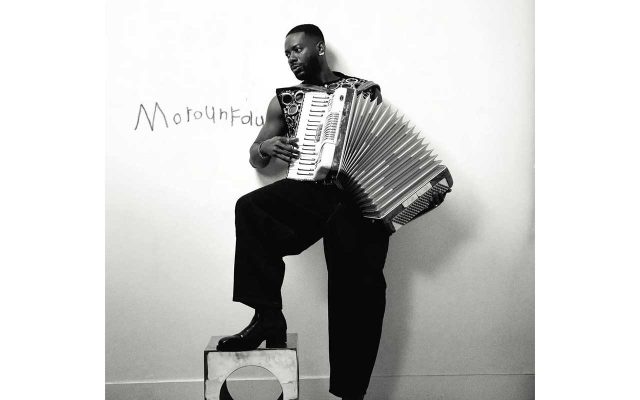- 'King of Afrobeat' Fela Kuti honoured in Landmark Lagos exhibition
- From Paris to Lagos: Afrobeat rebellion exhibition strengthens cultural ties between Africa, Europe
- LOUD Urban Choir marks sold-out sixth anniversary show at Terra Kulture with 'Living Loud'
- Ayra Starr sets new record with 3M views in 24hrs
Once upon a time, Fuji music was once the soundtrack of Nigeria’s hottest dancefloors. The percussive-leaning genre, bristling with a meld of indigenous instruments like the Agogo, sekere, and bembe, among others, was created by Alhaji Sikiru Ayinde Barrister circa the mid 50s.
Barrister, who emerged from popular Were (pronounced Way-ray) music traditions of Isale Eko, Mushin and Oyingbo, popularized the genre after he began inflecting Quranic recitations in his lyrics and use of the harmonica.
While Were music was strictly performed only during the month of Ramadan, Barrister knew he had to distinguish his style to allow him perform it outside of Ramadan. And on one fateful day, he saw an advertorial for a tour to the Japanese Mount Fuji and he decided to christen his style of music as Fuji. He soon became a household voice across South-Western Nigeria, birthing a movement that has survived several generations and evolutions till date.
Fuji music itself evolved from Barrister’s special touch during the 70’s and 80’s, becoming increasingly popular with the rise of emerging talent like Fatai Adio, Waidi Akangbe, Iyanda Sawaba, Rahimi Ayinde, Love Azeez, Agbada Owo and Alhaji Ayinla Kollington who carried the torch with their various interpretations of the genre.
From the mid 80s till the early 2000s, Fuji music found more acceptance within mainstream Nigerian musicdom, introducing acts like Wasiu Ayinde, Adewale Ayuba, Wasiu Alabi Pasuma, Saheed Osupa, Muri Thunder, Remi Aluko, Sir Shina Akanni, Alhaji Isiaka Iyanda Sawaba, Alayeluwa Sulaimon, Sule Adio (aka Atawewe), Taye Currency, and several others.
Within five decades, Fuji music became the pulse of Yoruba partying culture, with Hip Hop interpolations and radical stylized interpretations. However, with the rise of several other music traditions like Konto, Galala, Swo, Naija pop, Naija Rap, and several others, the genre quieted down with only a few adherents still raising its flag across the world.
The AG Baby Rebirth
When Nigerian music icon 9ice dropped his sophomore album Gongo Aso in 2008, it was a defining moment for Afrobeats. Although Fuji and Hip Hop were the cornerstones of his hit records, Fuji music barely scratched the surface of public consciousness. It still lingered as a minority sound, enjoyed mostly in local suburbs across South-Western Nigeria.
The same thing happened recently with the Grammy-nominated superstar Asake, whose vibrant fusion of Fuji music, Hip Hop, and Afrobeats have caught global attention since 2022 till date. Although his fame soared, Fuji Music didn’t enjoy the same attention.
Two days ago, award-winning star Adekunle Gold announced October 3rd as the release date for his sixth album which he ceremoniously titled Fuji. While his discography holds a tangible presence of the influence of Yoruba indigenous music, nothing could have prepared listeners for a Fuji-tributing Adekunle Gold album. Not even the obvious presence of the genre in his last two singles, “Coco Money” and “Bobo (with Lojay and Shoday)” hinted at a Fuji-themed album.
His bold decision to call his album Fuji makes one curious as to his chances of giving the Yoruba cultural heritage its long-awaited moment in the mainstream.
The short answer is Yes. But the long answer is that it would require the same intentionality that birthed the genre itself. Fuji music itself is a raspy dance groove, an approach AG Baby has executed seamlessly with his discography especially on songs like “Party No Dey Stop”, “High”, “Ogaranya”, among others. One would expect a powerful fusion of Fuji’s instrumentation with modern influences, including electronic dance music, pop and, perhaps, Hip Hop. Fuji music, with an average tempo of 135 beats per minute requires high octane energy to unlock that savoury delivery that keeps it addictive on dancefloors. Adekunle Gold’s interpolations have to brim with a tempered cadence that retains his soft-heavy vocal signature and Fuji’s overwhelming gusto.
Another important element that must be present in Adekunle Gold’s album is his infusion of personality within his thematic direction. For a Fuji album to properly resonate to local and even global audiences, it must soar with a touch of originality in the storytelling. And Adekunle Gold’s prowess at turning his personal life stories into ageless anthems as he did on songs like “Pick Up” and “Orente” would need to be heavily present across this album to achieve the profound catharsis that it needs to spread beyond borders. It’s similar to how Magic System’s 2000s hit, “Premier Gaou” struck like a meteor, with stories so real that they connect deeply with the listener irrespective of language barriers.
Another important facet of AG Baby’s attempt at exporting Fuji music at this time is the inclusion of global collaborations. It’s key to attracting international press, festival tours, and social media virality. With confirmed global collaborations such as Pharrel Williams, Swae Lee, 79th Element, the musician is poised to ascend into American and European musicdom. Another iconic collaboration on the album is Fuji music veteran Kwam 1 The Ultimate, who popularized his ‘Talazo Fuji’ style in the early 80s. These collaborations indicate a neat dose of vintage Fuji nostalgia with futuristic Fuji fusions. The album has to ring as a Fuji record, not just in title, but in sound and spirit.
Fuji music also extends beyond its sonics; it’s a culture that includes classic Yoruba fashion interpreted with contemporary luxury, opulent lifestyle, colourful live performances, and street carnivals. A Fuji album from an artist of Adekunle Gold’s stature must bring mainstream cultural elements to the culture of Fuji music to make the genre relevant to newcomer generations.
Only time would tell whether Adekunle Gold’s attempt would bear fruit, as he gears to release the album October 3. Nonetheless, if there’s anyone with a strong chance of navigating the road less travelled and resuscitating the genre’s appeal on a global scale, it is Adekunle Gold








